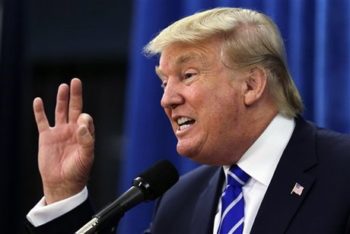
U.S. President Donald Trump said on Friday trade wars were good and easy to win.
His comments struck a defiant tone after global criticism of his plan to slap tariffs on imports of steel and aluminum that triggered a slide in world stock markets.
While the European Union pledged firm counter-measures, China urged Trump to show restraint. Canada, the biggest supplier of steel and aluminum to the United States, said it would retaliate if it is hit by U.S. duties.
Trump said on Thursday that tariffs of 25 percent on steel imports and 10 percent on aluminum, designed to safeguard American jobs in the face of cheaper foreign products, would be formally announced next week.
“When a country (USA) is losing many billions of dollars on trade with virtually every country it does business with, trade wars are good, and easy to win.
“Example, when we are down $100 billion with a certain country and they get cute, don’t trade anymore-we win big. It’s easy!” the U.S. president tweeted on Friday.
The European Commission, the EU executive, called the tariffs a blatant intervention that amounted to protectionism.
While promising to act “firmly”, the European Union, which sees itself as a global counterweight to a protectionist-leaning Trump, made no mention of retaliation but spoke of counter-measures that confirm with World Trade Organization (WTO) rules.
“We see international trade relations as a win-win situation.
“We don’t see this as a situation where, like in a zero-sum game, one party loses because another party wins. Trade is beneficial for everyone. It needs to take place on the basis of rules and these rules are in place,” an European Commission spokesman said.
Safeguard measures, last deployed by Europe in 2002 after then U.S. President George W. Bush imposed steel import duties, would be designed to guard against steel and aluminum being diverted to Europe from elsewhere if U.S. tariffs come in.
But to conform with WTO rules such measures would have to apply to imports from all countries and could also hit producers from China, India, Russia, South Korea to Turkey.
Fears of retaliation from Canada, China and Europe sent world stocks tumbling and drove investors towards the traditional safe plays of government bonds and the Japanese yen. Europe’s STOXX 600 index fell 1.5 percent, following declines on Wall Street and in Asian markets.
“It is a real worry because Europe is an open global economy so it isn’t just about U.S. versus China. And we will see retaliation there are no two ways about it,” said Ian Ormiston, European equity fund manager at Old Mutual Global Investors.
Steel has become a key focus for Trump, who pledged to restore the U.S. industry and punish what he sees as unfair trade practices, particularly by China.
Although China accounts for only 2 percent of U.S. steel imports, its massive industry expansion has helped produce a global steel glut that has driven down prices.
“China urges the United States to show restraint in using protective trade measures, respect multilateral trade rules, and make a positive contribution to international trade order,” said Chinese Foreign Ministry spokeswoman, Hua Chunying.
Asian steelmakers also worry that U.S. tariffs could result in their domestic markets being flooded with steel products that have nowhere else to go.
ArcelorMittal, the world’s biggest steelmaker with sizeable European and U.S. operations, said it was assessing the likely impact, although it said governments were right to take a tough approach to unfair trade.
Agency Report